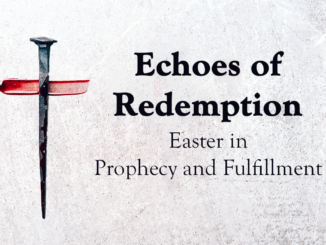
For most pastors, Easter is like the Super Bowl, the World Series, the NBA Championship, and Sunday at the Masters, all rolled into one day or weekend. That may sound like an exaggeration, but I have been there and lived it, and I can assure you that it is not. Every year, there is a buildup of pressure and often unrealistic expectations on the pastor. Will the message make sense, or will it be a flop? Will we have more people than last year? Is it going to rain (or snow, depending on where you live)? These questions and many more rattle around inside a pastor’s mind for weeks leading up to Easter.
The challenge is how a pastor truly prepares himself for Easter. Embarking on the preparation journey for Easter as a pastor involves a multifaceted approach aimed at enriching both personal spirituality and the congregational experience.
The first cornerstone in this endeavor is Spiritual Reflection. Here, the emphasis lies on engaging in profound introspection, delving into the roots of one’s faith journey. This involves more than a cursory examination; it calls for a comprehensive exploration of pivotal moments, influences, and challenges that have shaped personal faith. By embracing discomfort and genuine transparency, pastors can forge a more authentic connection to the Easter message. This deep, personal understanding becomes the bedrock upon which impactful sermons and messages are built, resonating more profoundly with the congregation.
By embracing discomfort and genuine transparency, pastors can forge a more authentic connection to the Easter message. Click To TweetScripture Study serves as the second pillar, urging pastors to immerse themselves in relevant biblical passages with a laser focus on the Easter narrative. Moving beyond superficial readings, pastors are encouraged to delve into historical and cultural contexts, linguistic nuances, and theological intricacies. This expansion of knowledge contributes to a more detailed and comprehensive grasp of scripture, empowering pastors to share the Easter message with depth and authenticity.
The third aspect, Prayer and Meditation, directs pastors to dedicate specific time to connect with God through prayer and meditation. This isn’t a routine task but a deliberate effort to seek guidance and inspiration. Spend time praying for every aspect of your Easter services. Conduct a prayer walk through the church, praying over every inch and every person who will be there.
Spend time praying for every aspect of your Easter services.
Investing ample time in crafting a meaningful and impactful Easter sermon forms the fourth dimension: Sermon Preparation. This isn’t a mere assembly of words but a creative and thoughtful process. Pastors are encouraged to infuse authenticity and creativity, preach the Word with boldness, and explore diverse techniques to communicate God’s Word clearly. By engaging with contemporary issues and relating them to the timeless message of Easter, sermons become not just informative but deeply resonant with the lived experiences of the congregation.
Pastoral Care, the fifth aspect, calls for an expansion beyond routine interactions. Pastors are challenged to actively seek out and address the diverse needs of the congregation, especially those facing challenging circumstances. This is an important season of shepherding your flock.
The sixth element, Logistics and Details, shifts the focus to the organizational aspects of Easter services. Here, pastors are urged to pay meticulous attention to logistical details, ensuring a seamless and memorable experience for all. Going beyond the routine, pastors can transform this process into a collaborative, community-building effort. By organizing volunteer teams and involving members with specific skills, there’s a sense of collective ownership and pride in the Easter celebrations.
Ensuring personal well-being takes center stage as the seventh dimension. Personal Well-being is not just about physical health but a comprehensive plan that encompasses mental and emotional aspects. This season of ministry is exhausting. Every pastor knows this, but not all pastors take care of themselves well enough during this time.
Fasting, the eighth aspect, explores the incorporation of fasting as a means of spiritual discipline leading up to Easter. Consider incorporating fasting or a focused period of self-denial as a means of spiritual discipline leading up to Easter, fostering a deeper connection to the season.
Consider incorporating fasting or a focused period of self-denial as a means of spiritual discipline leading up to Easter, fostering a deeper connection to the season. Click To TweetThe ninth element, Easter Devotional, involves developing or recommending a resource for personal reflection and study during the week leading up to Easter. Plenty of “reading plans” are available for free on the YouVersion Bible App. Another option is to provide some sort of devotional guide for the weeks following Easter.
Finally, What Happens Next encourages pastors to make plans for sermon series in the weeks following Easter. This isn’t a routine planning task but an opportunity for forward-thinking and creativity. Pastors can explore interdisciplinary approaches and integrate book studies or community projects with sermon series.
In essence, the holistic approach to Easter preparation for pastors involves a delicate balance between personal introspection, scholarly engagement, spiritual practices, and congregation involvement. It’s a transformative journey that goes beyond routine tasks, challenging pastors to deepen their connection to the Easter message and create an enriching experience for the congregation.

